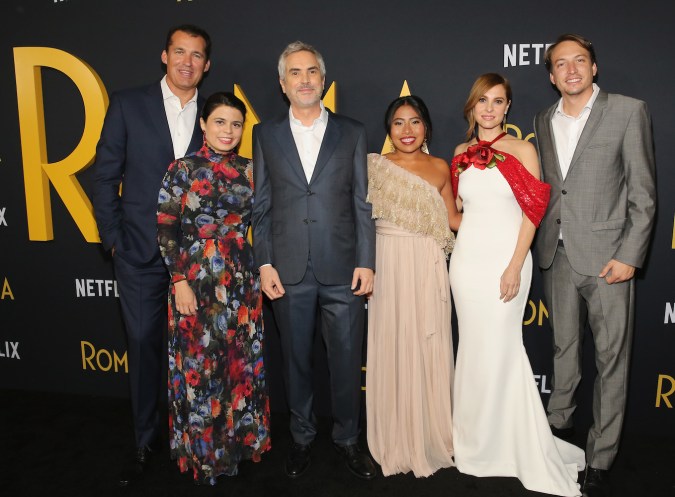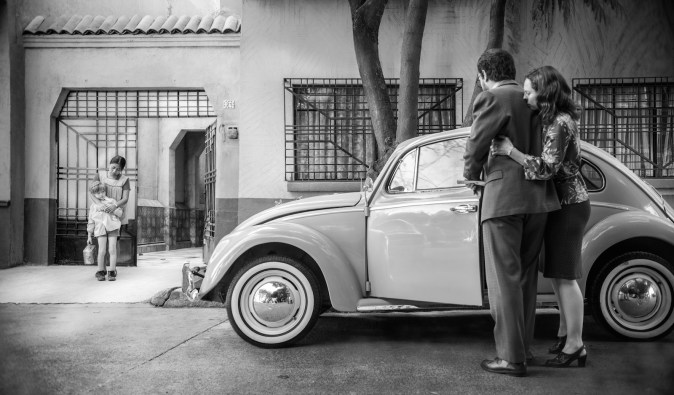When the Oscar nominations announced Roma as one of this year’s contenders for the top prize, it made history. As a member of the production team of Roma with Nicolás Celis and the film’s director-writer-cinematographer Alfonso Cuarón, Gabriela Rodriguez became the first Latin American woman up for the best picture Oscar. With a record ten nominations for the black-and-white drama, hopes are high heading into the Academy Awards, but for Rodriguez, it’s just another chapter in her 15-year career working with Cuarón.
Before she was on her way to Hollywood, Rodriguez was a lifelong film buff in Venezuela. “My mom and my dad are both major cinephiles,” she said. “Since I can remember, I always wanted to work in film. I wasn’t sure what I wanted to do, because when I was younger, I wasn’t sure what anyone actually did on a movie set. Early on, when I started university, I knew that producing would be my thing.”
Rodriguez left Venezuela, trading Caracas for film school in Boston and New York. “I went to Suffolk University, and I did summers and my film credits at NYU Tisch,” she said. “Suffolk didn’t have a strong film program, but I loved living in Boston. I got the best of both worlds.”
With her family’s support behind her, Rodriguez tried to break into the entertainment industry. Luckily, it was a family connection that would incidentally lead her to work with Cuarón. “I was in New York after university desperately looking for a job while I was interning at a TV production company,” she said. “My mom was coming from Caracas to visit me in New York, and next to her was someone that she knew but not very well. He told her that his girlfriend was working for Cuarón’s production company and he thought that they were looking for someone. So, I sent my CV in. He interviewed me the next day, and they asked if I could start right away. I left my other internship, started interning in Alfonso’s company in New York. Two months after that, he hired me as his personal assistant.”
Rodriguez was gradually given more responsibilities after first working as the director’s assistant on Children of Men. She became an associate producer for Gravity, and later lead his production company. Then he asked her to produce Roma, his most personal film to date.

Rodriguez’s rise through the ranks wasn’t easy, but her determination helped her through some of the hard-learned lessons. “I tried to fake it ’til I made it,” she said. “I had never worked on a film set, but I have the attitude that I could figure out anything. I lived in so many countries around the world, I figured, ‘I’ll adapt. I’ll figure it out.’ That’s been my attitude since I was really young. Maybe it’s a Venezuela thing? I’ll survive whatever I need to do.”
“I kept taking the A.D.’s paperwork all the time until someone had to come to explain to me that I was not the Assistant Director.”
Her first challenge met her as soon as she arrived in England to work on Children of Men. “When I landed in London, the production had sent me a rental car and a map,” Rodriguez said. At that time, there was no GPS. I had to be at Pinewood Studios – which was like a 50-minute or hour drive – at 8:30 a.m. [the next day]. I’ve never driven on the other side of the road. I have never been to London, so I spent all day practicing driving. I didn’t want to let anyone down. I made it.”
Today, Rodriguez laughs about her rookie mistakes on set. “In the production office, there was an inbox for mail for call sheets,” she said. “There was an inbox for an A.D., an Assistant Director. I thought it was for the assistant to the director, so I thought it was my inbox. I kept taking the A.D.’s paperwork all the time until someone had to come to explain to me that I was not the A.D. There were amazing people on the crew of Children of Men that really helped me out.”
One of those helpful crew members on set was Rodriguez’s boss, Cuarón, who continues to mentor her. “This has been my only job, even if it’s been evolving, growing and changing through the years,” she said. “He’s been an amazing mentor in life. Not only does he encourage me, he pushes me more than I push myself. The way our relationship and dynamic has evolved has taught me a lot. I admire him incredibly, and I’m grateful not only for the opportunities but for always having faith in me. He never lets me give up. He’s always encouraging me, even if it’s not always sweet, it’s positive. There’s a lot of tough love in this relationship, but I appreciate it.”
For many reasons, Roma was a challenge, even for the award-winning director and his newly promoted producer. “It was the first time I worked independently from a studio,” Rodriguez said. “There’s someone that’s overseeing the logistics of it all. While here, this project was funded by Alfonso, our production company Esperanza, and Participant Media. The way it was set up, Nico Celis, my co-producer, and I had to manage the budget and give Alfonso everything he needed – on top of Alfonso not sharing a script, that we were shooting mostly with non-actors and were shooting in continuity. All those were additional challenges.”

“Alfonso wanted to shoot most of the film in the real locations where the events happened,” said Rodriguez of one of the biggest production hurdles of the movie. “It wasn’t like we had alternatives from any of the locations where we needed to shoot. It needed a more polite approach and support from the different entities, owners or leasers of the different places.”
“I would love to work in Venezuela. Hopefully, this gets resolved soon, and I get to go do something back home.”
Thankfully, not all of Cuarón’s demands were difficult challenges. Some even yielded unexpected results. “Alfonso was also keen in crewing up our entire team with people who were not necessarily the most famous in Mexico or the most established,” Rodriguez said. “More the ones that were 100 percent committed and eager to participate in this, those that maybe hadn’t had the opportunity to work on a big project before, but they are super talented. Even if there were young, even if they had not lived through the seventies, that they were willing to embark on this very atypical adventure. It was like, ‘Can you do this? Do you want to, are you ready for this? Yes. Come on.’ It worked out beautifully. We’re so happy with the crew that we had.”
The new spotlight on Rodriguez’s work has rightfully brought attention to the amount of behind-the-scenes work it takes to pull off movies. Even for a film as deeply tied to its director as Cuarón is to Roma, there are still many, many people working together to achieve that vision. Rodriguez’s advice to aspiring producers is simple: “Work really hard and stay humble,” she said. “I always know that there’s something more to learn. Always know that you can do better and that no production is the same.”
In the same way that Cuarón was able to return to Mexico City to make Roma, perhaps Rodriguez will someday have the chance to return to Venezuela to make a movie. “I just left for a year abroad, and it’s been more than 20 years,” she said. “I’m always incredibly happy when I’m home, my family’s home. I am eager to go back, especially in these trying times when we’re fighting for change. We’re trying to end the dictatorship. I’m actively fighting with the opposition whenever I can. I would love to work in Venezuela. Hopefully, this gets resolved soon, and I get to go do something back home.”




